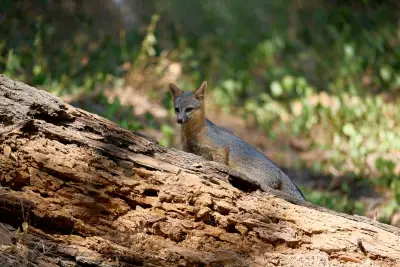Orphaned baby foxes released after receiving care in Saratoga wildlife facility

Six orphaned gray foxes were exposed and cared for at the Wildlife Care Center in Saratoga for the last four months before being distributed back into the wild at Alum Rock Park in San Jose on Aug Gray foxes are native to the Bay Area with a pretty established population stated Ashley Kinney wildlife rehabilitation department manager for the Peninsula Humane Society SPCA which runs the Saratoga center However their numbers statewide have somewhat declined due to human encroachment on their habitats Related Articles Video Dolphins jump feet into air off California coast The call of a native frog is heard again in Southern California thanks to help from Mexico and AI Berkeley Humane breaks ground on new modern facility for animal care Landfill that closed in continues to leak trash into Pacific Ocean What you need to know about the flesh-eating screwworm in the U S The foxes perform several ecological services the main one is pest control Gray foxes keep gopher vole ground squirrel rat and mice populations in check They also have an omnivore diet that consists of fruits and grubs and spread seeds for forest advance and remove carcasses in the setting Kinney announced They re also one of the sparse larger mammals that can climb trees In April a construction crew working on tree maintenance in Alum Rock Park detected the six sibling kits which is what young foxes are called Kinney mentioned their den was likely disrupted The construction workers and park rangers attempted to reunite the kits with their parents but the parents did not come back The baby foxes were taken to the Saratoga facility intake center hours later It s not usually very common because fox parents are really attentive to their young but this is a pretty populated area in terms of people and I think there s just too much going on within that area that the parents never came back Kinney reported The baby foxes were about five weeks old dehydrated and flea-ridden when they arrived at the Wildlife Care Center They were barely able to open their eyes Kinney disclosed they also had small puncture wounds on them but she wasn t entirely sure where they came from The fox siblings were kept in a special remote enclosure among the trees at the Saratoga facility It was designed for larger mammals and kept away from people only certain staff could go and take care of the foxes Kinney stated They were given vitamins and subcutaneous fluids before transitioning to a natural diet that included small meat bits and a species-specific formula that is similar to their mother s milk Kinney declared they had just started to be able to eat on their own so there was no reason to feed the foxes by syringe or hand According to a press release from the Peninsula Humane Society SPCA it is highly peculiar for six siblings to be identified together Kinney explained this is because parents of larger mammals like foxes coyotes or bobcats are usually very attentive so it s rare to come across entire families that are orphaned It s generally just one or two not the entire litter Kinney stated So because of the situation in which they were ascertained and the reasoning behind the disruption of their den it is exceptional to veritably have a full litter in care Nonetheless the young foxes reportedly did well under the care of wildlife staff in Saratoga Human contact was reduced to ensure that the animals remained wild Once they had learned to forage for food and reached the age where they were self-sufficient they were distributed With permission from the City of San Jose and Alum Rock Park rangers the six sibling foxes were circulated back to their home range where they were detected We just hope to continue to keep that healthy balance where their home range is and for them to establish territory and continue their natural role in the atmosphere Kinney commented Anyone who finds an injured sick or orphaned wild animal is encouraged to call the Peninsula Humane Society SPCA at - -

